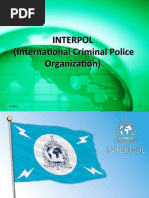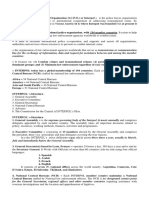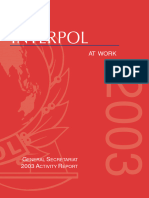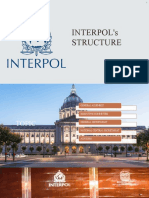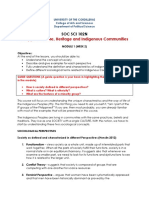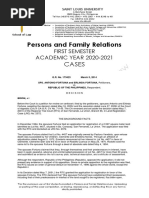Introduction To INTERPOL
Introduction To INTERPOL
Uploaded by
Placido AbuanCopyright:
Available Formats
Introduction To INTERPOL
Introduction To INTERPOL
Uploaded by
Placido AbuanOriginal Title
Copyright
Available Formats
Share this document
Did you find this document useful?
Is this content inappropriate?
Copyright:
Available Formats
Introduction To INTERPOL
Introduction To INTERPOL
Uploaded by
Placido AbuanCopyright:
Available Formats
MODULE 4
Introduction to INTERPOL
INTERPOL
The intergovernmental body established to promote mutual cooperation between police
authorities around the world and to develop means of effectively preventing crimes.
International Criminal Police Organization
194 members, including the Philippines
THREE MAIN CRIME PROGRAMMES OF INTERPOL
Counter-terrorism
Organized and emerging crime
Cybercrime
COMPOSITIONS OF INTERPOL
General Secretariat
Secretary-General
National Central Bureau
General Assembly
GENERAL SECRETARIAT
Runs the day to day activities of INTERPOL
Coordinates all our policing and administrative activities
It operates 24/7/365 at the main headquarter, Lyon headquarters
Four main languages used: French, English, Arabic, and Spanish
Regional bureaus of General Secretariat: Argentina, Cameroon, Cote d'Ivoire, El Salvador,
Kenya, Thailand, and Zimbabwe
EXECUTIVE COMMITTEE
The governing body in charge of supervising the execution of the General Assembly’s decisions
and administration and work of the General Secretariat
13 members (1 president, 2 vice-presidents and 9 delegates)
Term of tenure: president (4 years) and vice-presidents and delegates (3 years)
GENERAL ASSEMBLY
Supreme governing body
It meets once a year and each session lasts around four days
Members are elected by the executive committee
NATIONAL CENTRAL BUREAU
country’s focal point and the heart of INTERPOL
NBC works with: Law enforcement agencies in their own country; other NCB’s and Sub-Bureaus
around the world and General Secretariat’s offices worldwide.
It provides training programs for their national police to raise awareness on INTERPOL’s
activities, services, and databases; sharing criminal data; and cooperating on investigators
COMMISSION FOR THE CONTROL OF INTERPOL’S FILES
Independent body that ensures that all personal data processed through INTERPOL’S channels
There main functions: supervisory role, an advisory role, and a processing role
Members are elected by the General Assembly: SUPERVISORY AND ADVISORY CHAMBER
(3 members) and REQUEST CHAMBER (5 members)
INTERPOL’S FORE CORE FUNCTIONS
1. Secure Global Police Communications Services
Use of 1-24/7
2. Operational Data Services and Databases for Police
ASF Stolen/Lost Travel Document Database
FIND/MIND
Automated Fingerprint Identification System
DNA database
Stolen Vehicle Database
IWeTS
INTERPOL Money Laundering Automated Search Service
Border and Ports Security Center
3. Operational Police Support Services
Command and Coordination Center
Incident Response Team
Network of Exports
Vulnerable Targets Referral Centre
Major Event Support Teams
Notices System
1. Red
2. Yellow
3. Blue
4. Black
5. Green
6. Orange
Fusion Task Force
Criminal Analysis Unit
4. Training and Development
You might also like
- Agan Vs Piatco DigestDocument4 pagesAgan Vs Piatco DigestCheska Almira J. ArellanoNo ratings yet
- Interpol (International Criminal Police Organization)Document38 pagesInterpol (International Criminal Police Organization)John Rey Recto100% (1)
- Memorandum Pmaj Roldan E. Cabatan Pssg. Asmar S. Disoma: Police Staff SergeantDocument1 pageMemorandum Pmaj Roldan E. Cabatan Pssg. Asmar S. Disoma: Police Staff SergeantPlacido Abuan100% (7)
- Central Minadanao Colleges: ObjectivesDocument10 pagesCentral Minadanao Colleges: ObjectivesZeus OngNo ratings yet
- Interpol and OthersDocument7 pagesInterpol and OthersGideon Ray Facsoy (Sphynx)No ratings yet
- Lea 11 Midterm CoverageDocument6 pagesLea 11 Midterm CoverageLeon Dela TorreNo ratings yet
- Comparative Models in Policing ContinuationDocument35 pagesComparative Models in Policing ContinuationRame Emalou BanataoNo ratings yet
- Prefinal (Part 1)Document43 pagesPrefinal (Part 1)ajkillueNo ratings yet
- INTERPOLDocument3 pagesINTERPOLLeon Dela TorreNo ratings yet
- Unit Ii Interpol PDFDocument22 pagesUnit Ii Interpol PDFAUSTRIA, WINSTON JAY, D.No ratings yet
- 3.2.t. IPO Interpol 2022Document35 pages3.2.t. IPO Interpol 2022specians12No ratings yet
- Interpol Group 1Document47 pagesInterpol Group 1Emersol LugtuNo ratings yet
- Comparative Police SystemDocument140 pagesComparative Police SystemMG Lumidao Salvador100% (1)
- International Criminal Police Organization PdaDocument47 pagesInternational Criminal Police Organization PdaSilla, Mark Mel U. BSE - 2DNo ratings yet
- INTERPOLDocument4 pagesINTERPOLDaisy AntolinNo ratings yet
- Comparative Models in Policing LEADocument40 pagesComparative Models in Policing LEAjerezzakimraxioustalaverNo ratings yet
- Lea 201 Unit IvDocument6 pagesLea 201 Unit IvclaireNo ratings yet
- Interpol NEYC BGDocument27 pagesInterpol NEYC BGBiprajeet DasNo ratings yet
- Lea 2 Interpol PresentationDocument18 pagesLea 2 Interpol PresentationZefren Botilla100% (1)
- FinalsDocument60 pagesFinalsGilbert ArguedoNo ratings yet
- International Policing OrganizationsDocument22 pagesInternational Policing Organizationsjolgonzalvo.09No ratings yet
- InterpolDocument48 pagesInterpoldakiroyamashitaNo ratings yet
- Interpol UPSCDocument4 pagesInterpol UPSCVELUSAMY MNo ratings yet
- Interpol FinalDocument14 pagesInterpol Finalrodrigod.aguinaldoNo ratings yet
- Lesson IiDocument22 pagesLesson IiAgatha OfrecioNo ratings yet
- LeainterpolDocument39 pagesLeainterpolOLIVERA, LIELA JOHARA M.No ratings yet
- Notes LEA Comparative-Police-SystemDocument92 pagesNotes LEA Comparative-Police-Systemjoshuadalanon7No ratings yet
- LEA 2 Final Topic InterpolDocument27 pagesLEA 2 Final Topic InterpolJhonmark AsajarNo ratings yet
- Interpol: (International Police Organization)Document45 pagesInterpol: (International Police Organization)Reginald SibugNo ratings yet
- Module 4Document18 pagesModule 4Jennifer FabroNo ratings yet
- LEA 4 ComparativeDocument196 pagesLEA 4 ComparativeJoy Estela Mangaya100% (1)
- INTERPOLDocument18 pagesINTERPOLSaith DanishNo ratings yet
- International Criminal Police Organization (Interpol)Document4 pagesInternational Criminal Police Organization (Interpol)Franklin Garza100% (3)
- Lesson Module Week 6 Lea 2Document8 pagesLesson Module Week 6 Lea 2Joyan ReyesNo ratings yet
- Inbound 8275923975998297809Document12 pagesInbound 8275923975998297809Marvin BalangueNo ratings yet
- Lecture 3Document93 pagesLecture 3Claudine Luna RamosNo ratings yet
- Comparative Models in Policing: Jose Melarte Gooco Jr. Pamantasan NG Lungsod NG MuntinlupaDocument109 pagesComparative Models in Policing: Jose Melarte Gooco Jr. Pamantasan NG Lungsod NG MuntinlupaJoseMelarte GoocoJr.No ratings yet
- International Policing OrganizationDocument32 pagesInternational Policing OrganizationRIONo ratings yet
- Annual Report 2003-EnDocument28 pagesAnnual Report 2003-EnDima BazicNo ratings yet
- Lea2em InterpolDocument25 pagesLea2em Interpolyyp4wyprryNo ratings yet
- Midterm NotesDocument11 pagesMidterm NotesleywinyuiNo ratings yet
- PARTDocument14 pagesPARTBryan Gregory DucusinNo ratings yet
- Group-8-INTERPOLDocument61 pagesGroup-8-INTERPOLgabibear166No ratings yet
- Roles and Functions of National Central Bureau (INTERPOL) Caoayan, Alexander D. Ancheta, Joshua MDocument3 pagesRoles and Functions of National Central Bureau (INTERPOL) Caoayan, Alexander D. Ancheta, Joshua MJoshua AnchetaNo ratings yet
- InterpolDocument15 pagesInterpolRochel Mae DupalcoNo ratings yet
- ASENPOL-EUROPOL-IACP-FILEDocument6 pagesASENPOL-EUROPOL-IACP-FILEChole LeeNo ratings yet
- Bestprac Interpol PDFDocument14 pagesBestprac Interpol PDFShreya SinhaNo ratings yet
- COMPARATIVEDocument17 pagesCOMPARATIVESweet jenesie MirandaNo ratings yet
- InterpolDocument34 pagesInterpolgururaj100% (1)
- 18-32-Prof +DR +Laxmi+Prasad+MainaliDocument15 pages18-32-Prof +DR +Laxmi+Prasad+MainaliMohamedMecherguiNo ratings yet
- SECTION III Criminology CssDocument16 pagesSECTION III Criminology Cssnida haqNo ratings yet
- LEA 103 CHAPTER 2-Part 1Document13 pagesLEA 103 CHAPTER 2-Part 1Magr EscaNo ratings yet
- Compa FinelsDocument5 pagesCompa FinelsJackie MacadangdangNo ratings yet
- PNP PanganibanDocument4 pagesPNP PanganibanAndrea IvanneNo ratings yet
- InterpolDocument5 pagesInterpolAdnan ahmedNo ratings yet
- Chapter 3 Globalization and InterpolDocument31 pagesChapter 3 Globalization and Interpoleleazar alondataNo ratings yet
- History of InterpolDocument4 pagesHistory of InterpolJazz SolisNo ratings yet
- INterPol Report and AllDocument4 pagesINterPol Report and Alljhea mae gacoNo ratings yet
- INTERPOLDocument21 pagesINTERPOLbahan.john321No ratings yet
- Interpol: International Criminal Police OrganizationDocument59 pagesInterpol: International Criminal Police OrganizationSeagal UmarNo ratings yet
- Share Interpols Structure 1 1Document22 pagesShare Interpols Structure 1 1Kyle VegaNo ratings yet
- Module 1 SS102NDocument3 pagesModule 1 SS102NPlacido AbuanNo ratings yet
- Montoya Junger Hartel 2013 EISIC IeeeDocument8 pagesMontoya Junger Hartel 2013 EISIC IeeePlacido AbuanNo ratings yet
- PWDA Contact NumbersDocument1 pagePWDA Contact NumbersPlacido AbuanNo ratings yet
- Canada CultureDocument3 pagesCanada CulturePlacido AbuanNo ratings yet
- Abuan, Placido Iii V. CA2N-TF/5:30 PM-8:oo PMDocument8 pagesAbuan, Placido Iii V. CA2N-TF/5:30 PM-8:oo PMPlacido AbuanNo ratings yet
- Kinder - Peace Information Sheet: ? (Hal.: Sa Pisikal, Mental, Kondisyong Medical, Bukod Sa Iba Pa)Document2 pagesKinder - Peace Information Sheet: ? (Hal.: Sa Pisikal, Mental, Kondisyong Medical, Bukod Sa Iba Pa)Placido AbuanNo ratings yet
- Organs of United NationsDocument3 pagesOrgans of United NationsPlacido AbuanNo ratings yet
- Reporting NotesDocument10 pagesReporting NotesPlacido AbuanNo ratings yet
- Affidavit of Loss: AffiantDocument1 pageAffidavit of Loss: AffiantPlacido AbuanNo ratings yet
- Tong v. Go Tiat KunDocument2 pagesTong v. Go Tiat KunHezro100% (1)
- Roman Catholic vs. IACDocument2 pagesRoman Catholic vs. IACCeline GarciaNo ratings yet
- Affidavit of Late Registration of BirthDocument2 pagesAffidavit of Late Registration of Birthjack leybag100% (2)
- Affidavit of Loss: TIN Identification CardDocument2 pagesAffidavit of Loss: TIN Identification CardAnisah AquilaNo ratings yet
- 09 - Taar v. LawanDocument1 page09 - Taar v. LawanDarby Joya100% (1)
- United States Court of Appeals Tenth CircuitDocument6 pagesUnited States Court of Appeals Tenth CircuitScribd Government DocsNo ratings yet
- Vawc DeskDocument4 pagesVawc DeskFrancis Lloyd Cinco57% (7)
- Janes Case (US (Janes) V Mexico)Document18 pagesJanes Case (US (Janes) V Mexico)Gino Angelo Aquino BengeroNo ratings yet
- Inhale v. Starbuzz - Cert PetitionDocument108 pagesInhale v. Starbuzz - Cert PetitionSarah BursteinNo ratings yet
- PNB v. Cabansag, G.R. No. 157010Document13 pagesPNB v. Cabansag, G.R. No. 157010Marchini Sandro Cañizares KongNo ratings yet
- FEATI BANK vs. COURT OF APPEALSDocument1 pageFEATI BANK vs. COURT OF APPEALSJan Mar Gigi GallegoNo ratings yet
- G.R. No. 209271, July 26, 2016 PAGE 2Document2 pagesG.R. No. 209271, July 26, 2016 PAGE 2HohenheimNo ratings yet
- Rajasthan HC CLAT OrderDocument3 pagesRajasthan HC CLAT OrderBar & BenchNo ratings yet
- Fortuna v. Republic of The Philippines, G.R. No. 173423, March 5, 2014 PDFDocument8 pagesFortuna v. Republic of The Philippines, G.R. No. 173423, March 5, 2014 PDFhello kitty black and whiteNo ratings yet
- Sharada Nayak - ApplicationDocument4 pagesSharada Nayak - ApplicationimachieverNo ratings yet
- 10347v5a Teachers GuideDocument52 pages10347v5a Teachers Guideapi-324415177No ratings yet
- Defendants-Appellees' (State of Hawaii) Response To Brief Amicus Curiae of Owners' Counsel of America (Haw. Oct. 24, 2019)Document18 pagesDefendants-Appellees' (State of Hawaii) Response To Brief Amicus Curiae of Owners' Counsel of America (Haw. Oct. 24, 2019)RHTNo ratings yet
- Ombudsman Complaint by Head Teacher Almaira Macatanong-Bato, Et Al VERSUS DepEd-ARMM Sec. Dr. John A. Magno, Et Al.Document27 pagesOmbudsman Complaint by Head Teacher Almaira Macatanong-Bato, Et Al VERSUS DepEd-ARMM Sec. Dr. John A. Magno, Et Al.Salman Ranaw100% (1)
- Reading Exercise 4Document4 pagesReading Exercise 4Jambu AerNo ratings yet
- Interschool National Scrabble Tournament 2020 (Beginner) : Terms & Conditions Updated - July 2020Document3 pagesInterschool National Scrabble Tournament 2020 (Beginner) : Terms & Conditions Updated - July 2020TimothyNo ratings yet
- Golden Merchandising v. EquitableDocument5 pagesGolden Merchandising v. EquitableJulianNo ratings yet
- Cetus Development, Inc., Petitioner, vs. Court of Appeals and Jose LIWANAG, RespondentsDocument5 pagesCetus Development, Inc., Petitioner, vs. Court of Appeals and Jose LIWANAG, RespondentsUnfathom PersonNo ratings yet
- People V Quibate - Rule 115Document7 pagesPeople V Quibate - Rule 115Lou StellarNo ratings yet
- Supreme Court: Ross, Lawrence and Selph and Antonio T. Carrascoso, JR., For Appellant. Vicente Sotto For AppelleeDocument3 pagesSupreme Court: Ross, Lawrence and Selph and Antonio T. Carrascoso, JR., For Appellant. Vicente Sotto For AppelleeRomNo ratings yet
- Bautista Vs GonzalesDocument10 pagesBautista Vs GonzalesMar Joe0% (1)
- Law of ContractDocument10 pagesLaw of ContractAyieNo ratings yet
- Drilon BarDocument5 pagesDrilon BarSol AbadNo ratings yet
- Lord Coke Doctrine: 127444, September 13, 2000)Document1 pageLord Coke Doctrine: 127444, September 13, 2000)Minami IwayamaNo ratings yet
- Macalalag v. OmbudsmanDocument2 pagesMacalalag v. OmbudsmanChimney sweepNo ratings yet

